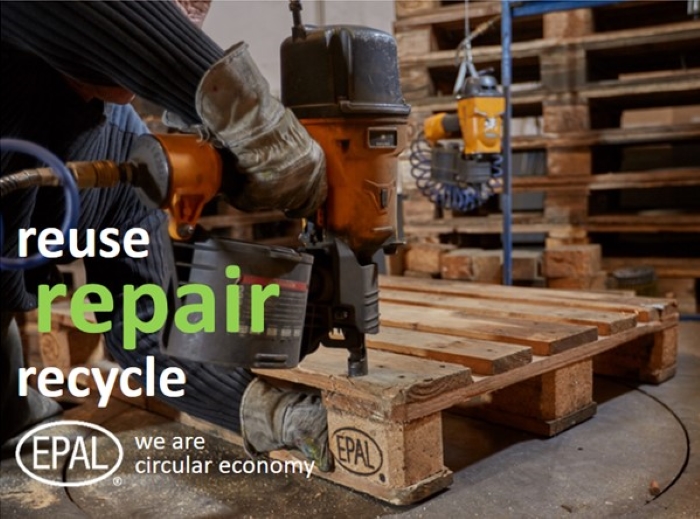Strengthening sustainability and the circular economy: EPAL allows Class C Euro pallets to be repaired with reclaimed boards and blocks
Strengthening sustainability and the circular economy:
EPAL allows Class C Euro pallets to be repaired with reclaimed boards and blocks
The Board of the European Pallet Association e.V. (EPAL) decided on 10/03/2022 to allow Class C EPAL Euro pallets to be repaired with reclaimed boards and blocks. This encourages the reuse of components made of wood as part of the circular economy and thus serves to protect the climate and wood resources.
At its meeting in Berlin on 10/03/2022, the EPAL Board decided to allow Class C EPAL Euro pallets to be repaired with reclaimed boards and blocks. The new regulation takes effect on 01/04/2022.
Until now, all used EPAL Euro pallets had to be repaired with new boards and blocks. This will continue to apply in future to Class A and Class B EPAL Euro pallets.
The aim of the permission to repair Class C EPAL Euro pallets with reclaimed components is to bolster the sustainability of the EPAL Euro pallet pool. The reuse, exchange and repair of EPAL Euro pallets in the EPAL Euro pallet pool is already a well-recognised exemplar for a sustainable circular economy. The permission to reuse reclaimed components makes a further important contribution to this. Using less new wood when repairing EPAL Euro pallets protects wood as a resource, reduces energy consumption and improves the carbon footprint of EPAL Euro pallet repairs.
Paulo Verdasca, EPAL Portugal representative on the EPAL Board of Directors:
"The reuse and exchange of EPAL Euro pallets in the EPAL Euro pallet pool is already an outstanding example of the principle of the circular economy: reuse - repair - recycle. We would like to extend the principle of reuse to repair and therefore allow undamaged, reclaimed boards and blocks to be used for repairs. Due to the high quality of new EPAL Euro pallets, if some elements of the pallet are irreparably damaged, other components are often still of such high quality that they can be used for repair without any loss of quality. This conserves wood resources, reduces energy use and thus contributes to climate protection."
Optimising the sustainability of the EPAL Euro pallet pool is not the only consideration here: quality assurance is still vitally important. The standardisation of all components and strict guidelines for the quality of reclaimed components form the basis and are supplemented by certification of repair operations and EPAL's comprehensive quality assurance system. This ensures that repaired EPAL Euro pallets are of a consistently high quality, even when reclaimed components are used.
Tatyana Sargsyan, EPAL Baltic States representative on the EPAL Board of Directors:
"It was vital for the EPAL Board that repairs completed using reclaimed boards and blocks do not compromise the high quality of used EPAL Euro pallets. The EPAL Board has therefore been discussing the regulations for the quality of reclaimed boards and blocks since September 2021 and has now decided on a strict set of rules. Many conversations between EPAL National Committees and both users and repairers have shown that the plan to allow the repair of EPAL Euro pallets with used boards and blocks has been unanimously welcomed."
Repair with reclaimed components is limited to Class C EPAL Euro pallets.
This is based on the new version of EPAL's Quality Classification, which was published in November 2021 (see EPAL's press release of 03/11/2021) and can be accessed on EPAL's website (https://www.epal-pallets.org/eu-en/translate-to-en-qualitaet-und-tausch/translate-to-en-qualitaetsklassifizierung). Class A and Class B EPAL Euro pallets, which are used in machines, conveyor systems and high-bay warehouses in the same way as new EPAL Euro pallets, will still have to be repaired with new boards and blocks in the future.
Jean-Philippe Gaussorgues, EPAL France board representative and EPAL Vice President:
"EPAL Euro pallets are used for many years. The average period of use is about 6-7 years, depending on the number of transport rotations. In their last years of use, many EPAL Euro pallets fall into class C, identifiable through dark, discoloured wood and visible signs of use. Class C EPAL Euro pallets are mainly used in the construction and haulage industries as well as for order picking. Good quality, reclaimed boards and blocks are sufficient for these pallets and EPAL Euro pallet users can order the specific quality they need and save money."

